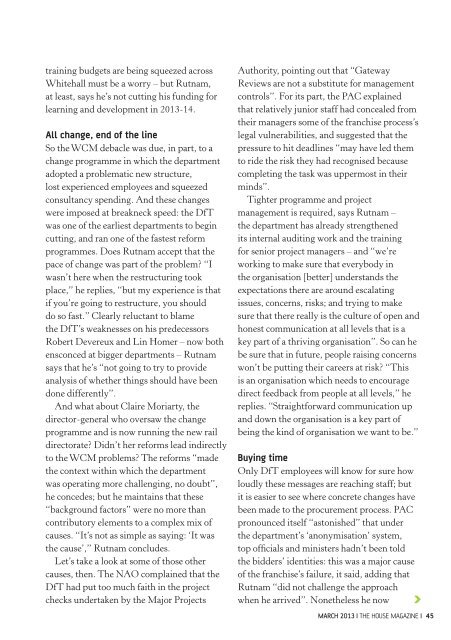Department
Department
Department
You also want an ePaper? Increase the reach of your titles
YUMPU automatically turns print PDFs into web optimized ePapers that Google loves.
training budgets are being squeezed across<br />
Whitehall must be a worry – but Rutnam,<br />
at least, says he’s not cutting his funding for<br />
learning and development in 2013-14.<br />
All change, end of the line<br />
So the WCM debacle was due, in part, to a<br />
change programme in which the department<br />
adopted a problematic new structure,<br />
lost experienced employees and squeezed<br />
consultancy spending. And these changes<br />
were imposed at breakneck speed: the DfT<br />
was one of the earliest departments to begin<br />
cutting, and ran one of the fastest reform<br />
programmes. Does Rutnam accept that the<br />
pace of change was part of the problem? “I<br />
wasn’t here when the restructuring took<br />
place,” he replies, “but my experience is that<br />
if you’re going to restructure, you should<br />
do so fast.” Clearly reluctant to blame<br />
the DfT’s weaknesses on his predecessors<br />
Robert Devereux and Lin Homer – now both<br />
ensconced at bigger departments – Rutnam<br />
says that he’s “not going to try to provide<br />
analysis of whether things should have been<br />
done differently”.<br />
And what about Claire Moriarty, the<br />
director-general who oversaw the change<br />
programme and is now running the new rail<br />
directorate? Didn’t her reforms lead indirectly<br />
to the WCM problems? The reforms “made<br />
the context within which the department<br />
was operating more challenging, no doubt”,<br />
he concedes; but he maintains that these<br />
“background factors” were no more than<br />
contributory elements to a complex mix of<br />
causes. “It’s not as simple as saying: ‘It was<br />
the cause’,” Rutnam concludes.<br />
Let’s take a look at some of those other<br />
causes, then. The NAO complained that the<br />
DfT had put too much faith in the project<br />
checks undertaken by the Major Projects<br />
Authority, pointing out that “Gateway<br />
Reviews are not a substitute for management<br />
controls”. For its part, the PAC explained<br />
that relatively junior staff had concealed from<br />
their managers some of the franchise process’s<br />
legal vulnerabilities, and suggested that the<br />
pressure to hit deadlines “may have led them<br />
to ride the risk they had recognised because<br />
completing the task was uppermost in their<br />
minds”.<br />
Tighter programme and project<br />
management is required, says Rutnam –<br />
the department has already strengthened<br />
its internal auditing work and the training<br />
for senior project managers – and “we’re<br />
working to make sure that everybody in<br />
the organisation [better] understands the<br />
expectations there are around escalating<br />
issues, concerns, risks; and trying to make<br />
sure that there really is the culture of open and<br />
honest communication at all levels that is a<br />
key part of a thriving organisation”. So can he<br />
be sure that in future, people raising concerns<br />
won’t be putting their careers at risk? “This<br />
is an organisation which needs to encourage<br />
direct feedback from people at all levels,” he<br />
replies. “Straightforward communication up<br />
and down the organisation is a key part of<br />
being the kind of organisation we want to be.”<br />
Buying time<br />
Only DfT employees will know for sure how<br />
loudly these messages are reaching staff; but<br />
it is easier to see where concrete changes have<br />
been made to the procurement process. PAC<br />
pronounced itself “astonished” that under<br />
the department’s ‘anonymisation’ system,<br />
top officials and ministers hadn’t been told<br />
the bidders’ identities: this was a major cause<br />
of the franchise’s failure, it said, adding that<br />
Rutnam “did not challenge the approach<br />
when he arrived”. Nonetheless he now<br />
march 2013 | THE HOUSE MAGAZINE | 45


